Diplomatic Bluebook 2020
Chapter 2
Japan's Foreign Policy that Takes a Panoramic Perspective of the World Map
Section 5 Russia, Central Asia and Caucasus
1 Russia
(1) Situation in Russia
A Internal Situation in Russia
President Putin's approval rating, which fell in 2018 to the level before the 2014 “annexation” of Crimea (in the 60% range), remained at largely the same in 2019 with no significant recovery. While strengthening the Government's base of support became an issue for the Government, in August, there were sporadic and relatively large-scale protests, particularly in large cities, over the disqualification of opposition candidates for the Moscow City Duma elections in September. The protests drew approximately 50,000 people, and the scale was the largest in recent years.
B Russian Economy
The Russian economy, which had been sluggish since 2014, turned to positive growth in 2016 and continued to grow in 2019, although the growth rate slowed compared to the previous year (preliminary 2019 figure: 1.3% (Russian Federal State Statistic Service)). In addition, other major macroeconomic indicators remained generally stable. However, some factors for economic instability remain, such as the continued sanctions on Russia by European countries and the U.S., and trends in crude oil prices in international markets. There is also dissatisfaction amongst the general public in regard to living standards, such as a slump in real income.
C Russian Diplomacy
Sanctions on Russia continue to be maintained by European countries and the U.S. despite occasional bilateral contacts between Russia and these countries, such as at the summit and foreign ministerial levels.
Particularly on Russia's relationship with the U.S., the Intermediate-Range Nuclear Forces (INF) Treaty was terminated in August, and an extension of the New Strategic Arms Reduction Treaty (New START) is still undetermined. The gulf remains wide between the positions of the two countries on desired formats of a future framework of arms control as well as on international situations such as Ukraine and Venezuela, and signs of improved relations are yet to be seen.
Exchanges between leaders of Russia and China continued, and in June Russia had a state visit by Chinese President Xi Jinping to celebrate the 70th anniversary of the establishment of diplomatic relations. In addition, in July there were also movements by Russia appealing for closer military cooperation with China, such as the first joint patrol flight by Russian and Chinese bombers from the Sea of Japan to the East China Sea, and on the same day a Russian Airborne Warning and Control System (AWACS) aircraft violated the airspace above Japan's territorial waters around Takeshima in Shimane Prefecture.
In the Middle East and Africa, Russia actively engaged in diplomacy, exerting its influence on the Syrian situation by intervening between related countries, such as Syria and Turkey, and holding the First Russia-Africa Summit in October.
Russia has also shown a strong presence in its traditional cooperative relationship with the Commonwealth of Independent States (CIS) and in multilateral frameworks including the BRICS countries (Brazil, Russia, India, China, and South Africa).
(2) Japan-Russia Relations
A Japan-Russia Relations in the Asia-Pacific Region
Bilateral relations between Japan and Russia have the greatest underlying potential. In recent years, Russia has placed importance on the development of the Russian Far East and East Siberia and has been proactively enhancing relations with the countries in the Asia-Pacific region that are a growth center of the global economy. The development of relations with Russia as an important partner in the Asia-Pacific region, the building of stable relations, and the deepening of cooperation contribute not only to Japan's national interests but are also extremely important for regional stability and development.
B The Northern Territories and Negotiations on Peace Treaty
The greatest concern between Japan and Russia is the Northern Territories issue. The Northern Territories are islands over which Japan has sovereignty. Holding frequent dialogues between the two leaders and Foreign Ministers, the Government of Japan has been energetically continuing negotiations with Russia to conclude a peace treaty through the resolution of the issue of attribution of the Four Northern Islands.1
The two leaders share the view that it is an abnormal state of affairs that a peace treaty has not been concluded between Japan and Russia more than 70 years since the end of World War II. At the Japan-Russia Summit Meeting held in Nagato City, Yamaguchi Prefecture, at the end of 2016, Prime Minister Abe and President Putin declared an earnest determination toward resolving the issue of a peace treaty.
In 2019, active political dialogues took place, including three Summit Meetings and seven Foreign Ministers' Meetings. At the Japan-Russia Summit Meeting in June in Osaka, Prime Minister Abe and President Putin shared the view that they would continue to advance the negotiations under their determination to “accelerate negotiations on a peace treaty on the basis of the Japan-Soviet Joint Declaration of 1956” as announced by both sides in Singapore in November 2018. At the Japan-Russia Summit Meeting in Vladivostok in September, the two leaders had a candid and open exchange of views on the issue of concluding a peace treaty and reconfirmed to work in a future-oriented manner. The two leaders also reiterated instructions to their respective foreign ministers, who are responsible for the negotiations, to advance joint work in order to find a mutually acceptable solution.
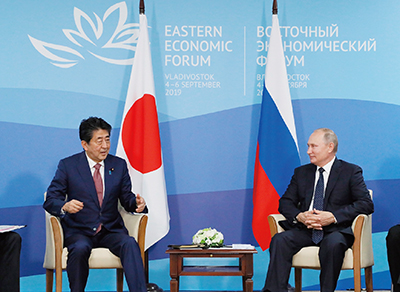 Japan-Russia Summit Meeting (September 5, Vladivostok, Russia; Photo: Cabinet Public Relations Office)
Japan-Russia Summit Meeting (September 5, Vladivostok, Russia; Photo: Cabinet Public Relations Office)In response to this, Foreign Minister Motegi and Foreign Minister Lavrov held the Japan-Russia Foreign Ministers' Meetings in New York and Nagoya in September and November respectively, and exchanged views on how to proceed with the consultations, including the negotiations on a peace treaty. Moreover, at the Japan-Russia Foreign Ministers' Meeting in Moscow in December, the two Foreign Ministers held discussions at length and were able to commence full-fledged consultations.
Regarding the joint economic activities on the Four Northern Islands on which the leaders agreed to begin negotiations during President Putin's visit to Japan at the end of 2016,2 a series of discussions have been held not only between the leaders and Foreign Ministers, but also at vice-ministerial consultations and director-general-level working groups. At the Japan-Russia Summit Meeting in June, the two leaders agreed on the two “business models” for “tourism” and “waste management.” Waste-management experts from both sides visited the main island of Hokkaido and the four islands in August and September, and the first pilot tour joined by Japanese tourists was conducted from October to November.
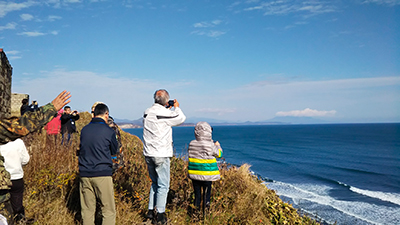 Sightseeing pilot tour
Sightseeing pilot tour (October 31, Kunashiri Island; Photo: World Air-Sea Service)
The Government of Japan is actively working on projects contributing to the improvement of the atmosphere for the resolution of the Northern Territories issue, such as the four-island exchange program, free visits, and visits to graves. In July, as part of humanitarian measures for the former island residents of the Northern Territories, a temporary additional entry/exit point was established on the occasion of the grave visit by ship to the Habomai Islands and Shikotan Island, and furthermore, in August a grave visit by airplane was realized for a third year in a row. Such measures have shortened the travel time to the Four Northern Islands and reduced the physical burden of the former island residents. During the grave visits, the former island residents were able to visit places they had been unable to go to in recent years, and Japan and Russia shared the view to continue to simplify the relevant procedures. Under the strong leadership of the Japanese and Russian leaders, the Government of Japan will continue to persistently negotiate with Russia to conclude a peace treaty by resolving the issue of attribution of the Four Northern Islands.
In addition, the Government of Japan is approaching and coordinating with the Russian side in order to ensure safe operations of Japanese fishing vessels around the Four Northern Islands and to continue the fishing of salmon and trout using alternative fishing methods to driftnet fishing prohibited by Russia. At the same time, Japan is taking appropriate actions against Russia's moves to build up military forces in the Four Northern Islands, on the grounds that such moves are contradictory to the Government of Japan's position regarding the territorial issue.
- 1 Please refer to the Ministry of Foreign Affairs' website for the Japanese government's position regarding the Northern Territories issue: https://www.mofa.go.jp/region/europe/russia/territory/overview.html

- 2 As a result of the Japan-Russia Summit Meeting in December 2016, the two leaders expressed their sincere determination to resolve the peace treaty issue, agreed to commence discussions on joint economic activities on the Four Northern Islands, and agreed to improve procedures for grave visits by former island residents.
C Japan-Russia Economic Relations
The Japan-Russia trade volume in 2019 decreased from January to December year-on-year due to a decrease in the import value of energy and mineral resources, major commodities imported to Japan from Russia (January-December 2019 statistics: approximately 2.3459 trillion yen, down approximately 7.2% year-on-year) (Source: Trade Statistics of Japan, Ministry of Finance).
The volume of direct investment from Japan to Russia decreased slightly from 178.0 billion yen (2017) to 168.8 billion yen (2018) (Source: Balance of Payments Statistics, Bank of Japan).
With regard to the Eight-point Cooperation Plan for Innovative Reform in the Fields of Industry and Economy and a Favorable Living Environment of Russia proposed by Prime Minister Abe in May 2016, over 200 private-sector projects have been established as of the end of 2019.
At the Japan-Russia Summit Meeting on the margin of the Fifth Eastern Economic Forum in Vladivostok in September, the two leaders welcomed the final investment decision on the Arctic LNG 2 Project,3 in which Japanese companies participate, as well as the conclusion of the special investment contract among a Japanese company, the Russian government and others on automobile manufacturing in St. Petersburg.
Foreign Minister Motegi and Minister of Economic Development Oreshkin co-chaired the 15th Meeting of the Japan-Russia Intergovernmental Committee on Trade and Economic Issues in Moscow in December, and bilateral economic relations were discussed comprehensively with the participation of members from relevant ministries and agencies and private companies. Both chairs pointed out that bilateral cooperation has been steadily advancing under the Eight-point Cooperation Plan, and they shared the view to further support these positive trends toward more concrete cooperation between Japanese and Russian companies.
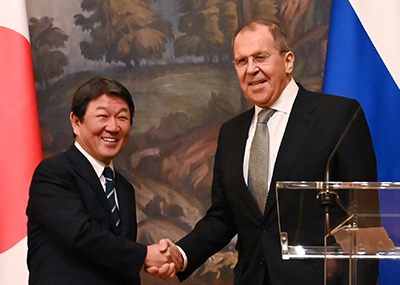 Japan-Russia Foreign Ministers' Meeting
Japan-Russia Foreign Ministers' Meeting (December 19, Moscow, Russia)
Furthermore, the Japan Centers operating in six cities in Russia carry out business matching between companies from both countries and hold management courses. To date, a total of some 90,000 Russian people have taken the courses and about 5,700 of them have visited Japan for training.
- 3 Liquified natural gas business conducted by a major Russian natural gas mining company in the Arctic Circle
D Cooperation between Japan and Russia in Various Fields
(A) Security, Defense Exchanges and Maritime Security
In 2019, discussions such as the Japan-Russia Strategic Dialogue were held between diplomatic authorities from the two countries in a wide range of areas including disarmament, non-proliferation, terrorism, and cyber security. Based on the agreement at the Japan-Russia Summit Meeting in January to broaden the scope of cooperation in areas that address “non-traditional threats” such as drugs, the Tokyo Customs K-9 Training Center was visited in January by United Nations Office on Drugs and Crime (UNODC) officials in charge of the construction of a drug detection dog training center in Afghanistan, which is being advanced by Japan, Russia, Afghanistan, and UNODC. Exchanges of views were also conducted between the relevant ministries and agencies of both countries in the field of anti-corruption. In the field of national security, the Japan-Russia Security Talks were held between the diplomatic authorities in March, the fourth Japan-Russia Foreign and Defense Ministerial Consultation (“2+2” Ministerial Meeting) was held in Tokyo in May, and a meeting between Mr. Kitamura Shigeru, Secretary General of National Security Secretariat, and Mr. Nikolai Patrushev, Secretary of the Russian Federation Security Council, was held in September. As for defense exchanges, General Yuasa Goro, Chief of Staff of the JGSDF, visited Russia in May, and Admiral Nikolay Yevmenov, Commander-in-Chief of the Russian Navy visited Japan in November. At the working level, in addition to various discussions and consultations, the Japan-Russia Search and Rescue Exercises (SAREX) were conducted in June, and furthermore, the Japan-Russia Maritime Security Agencies Secretary-Level Meetings were held, following on from the previous year.
(B) Human and Cultural Exchanges
Following the agreement at the Japan-Russia Summit Meeting of December 2016 on doubling youth exchanges, in 2019 a total of 860 people (2018: 1,334 people) participated in the Japan-Russia Youth Exchange Program, where exchanges took place in a broad range of areas.
Japan Year in Russia and Russia Year in Japan were held from 2018 to 2019 under an agreement between the Japanese and Russian leaders. Human and cultural exchanges were conducted actively through more than 600 Japan-related events held in Russia as part of the accredited events for the exchange year with more than 1.6 million participants. The closing ceremony for the exchange year was held in June 2019 in Osaka, with both leaders in attendance, and it was announced that 2020 to 2021 will be the Japan-Russia Year of Regional Exchanges.
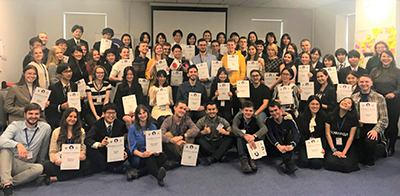 Japan-Russia Youth Forum 2019 (September 27, St. Petersburg, Russia; Photo: Japan-Russia Youth Exchange Center)
Japan-Russia Youth Forum 2019 (September 27, St. Petersburg, Russia; Photo: Japan-Russia Youth Exchange Center)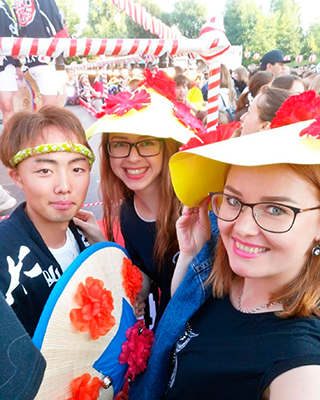 Japan-Russia Youth Exchange Program (‘Hanagasa dance,' July, Moscow, Russia; Photo: Japan-Russia Youth Exchange Center)
Japan-Russia Youth Exchange Program (‘Hanagasa dance,' July, Moscow, Russia; Photo: Japan-Russia Youth Exchange Center)